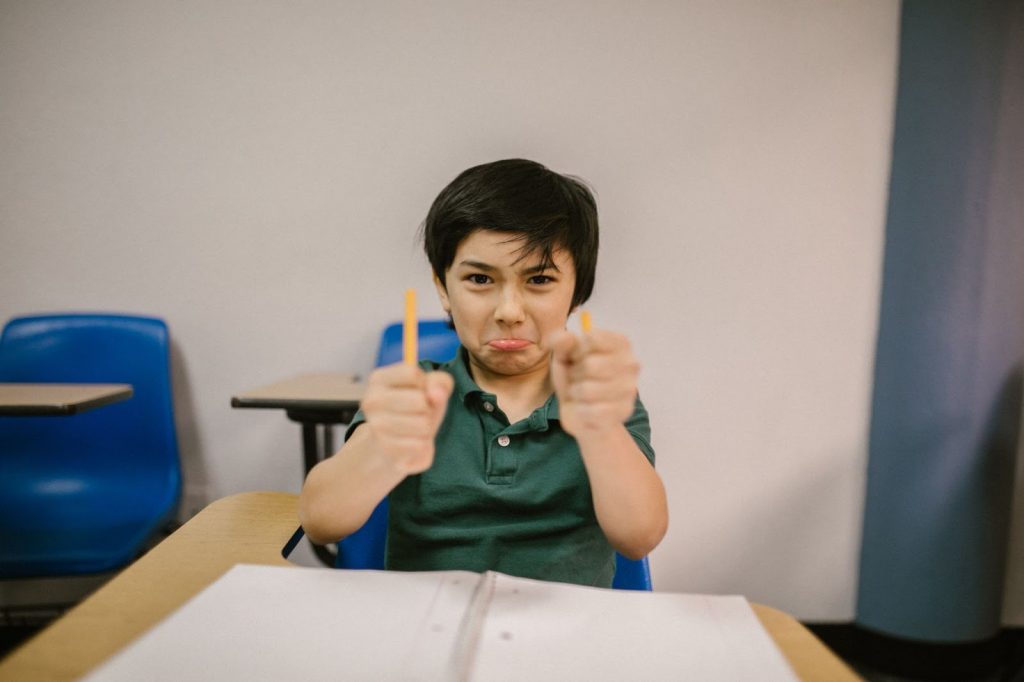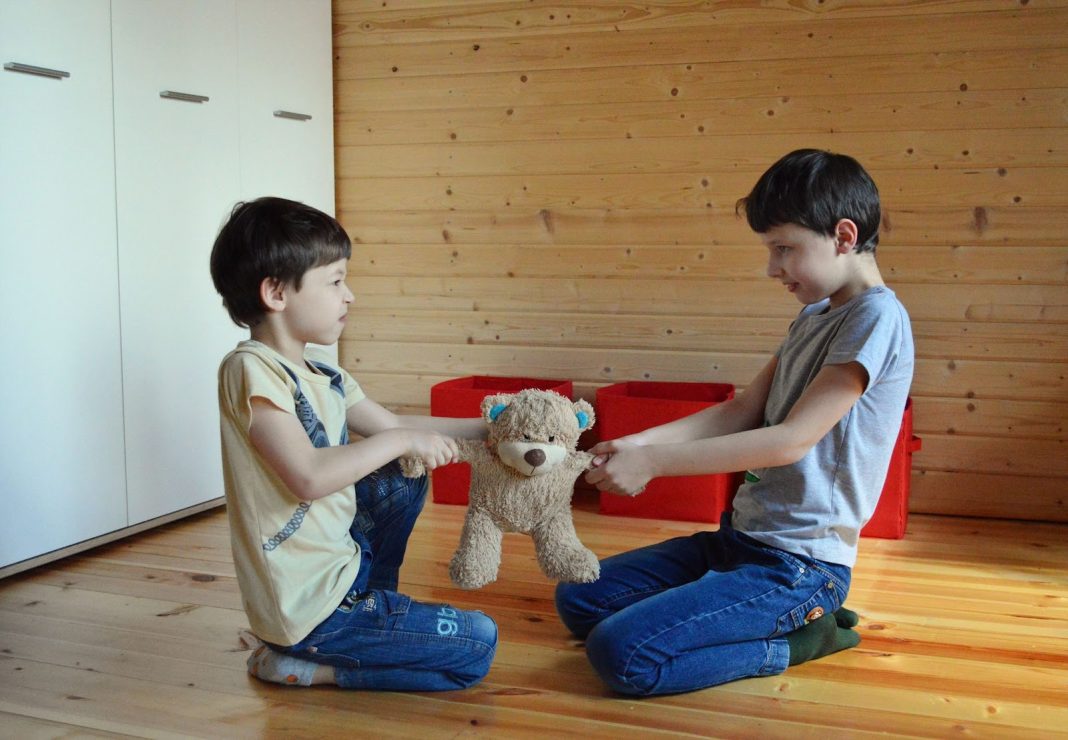Kids fighting is frequently seen in families with many children and is a natural phenomenon. Sibling rivalry is common, but ongoing disputes can harm the family dynamic and children’s emotional health. We’ll discuss helpful methods for handling sibling disputes and encouraging unity in the home.
Math & ELA | PreK To Grade 5
Kids see fun.
You see real learning outcomes.
Watch your kids fall in love with math & reading through our scientifically designed curriculum.
Parents, try for free Teachers, use for free
To understand how to stop kids from fighting, exploring the root causes of this behavior is essential. Children may fight for various reasons, from jealousy and competition for attention to simple boredom. Understanding why kids fight is the first step to finding effective solutions to prevent and manage conflicts.
“If we can teach children to respect themselves and others, we won’t have to worry about them fighting.” – Emmett D. Carson.
4 Reasons Why Kids Fight
Kids battling can happen for various reasons, from jealousy and competition for attention to simple boredom, but as a parent and teacher, we have to stay calm and listen to them. According to the pediatrician of Cleveland Clinic, we must celebrate individuality, create opportunities for cooperation, and stay calm and in control.
Here are the most common reasons why kids fight:
1. Attention-Seeking Behavior
One of the most common reasons why kids fight is attention-seeking behavior. Children may fight to gain their parents’ attention, especially when neglected or overlooked.
2. Power Struggle
Another common reason for children fighting is a power struggle. Kids may fight to assert dominance or control over their siblings, particularly in cases with a significant age gap.
3. Jealousy
Jealousy over perceived preferential treatment from parents or disparities in abilities, achievements, or privileges is also a common cause of children fighting.
4. Boredom
Children with nothing to do may fight gently to pass the time or to entertain themselves, which can eventually turn into serious fights.
Related Reading: Fun Games to Play When Bored: Boredom Busters for Kids
5 Types of Impacts of Fighting

Children fighting can have a long-lasting impact on their emotional, physical, psychological, and cognitive health. The following impact on children has been discussed in detail below.
1. Emotional Impact
One of the most pervasive effects of little kids fighting is its emotional influence. Children exposed to violence and conflict may go through various emotional reactions that may harm their mental health and general well-being. These reactions may include helplessness, guilt, shame, worry, and terror. Moreover, normalizing violence can lead to distorted perceptions of acceptable behavior, exacerbating emotional trauma.
2. Physical Impact
Physical injuries like small cuts and bruises are more dangerous for children. The physical impact can extend beyond injury because of disputes. Headaches can be caused due to stress from fighting.
3. Psychological Impact
Children who witness or experience violence in conflicts may develop post-traumatic stress disorder (PTSD) from flashbacks, nightmares, and other symptoms. They may struggle with anger, aggression, impulsivity, and difficulties forming healthy relationships.
4. Behavioral Effect
Activities like bullying siblings can change their behavior if they witness or experience fighting. These children may struggle with regulating their emotions, leading to disruptive behaviors that negatively impact their relationships.
5. Cognitive Impact
Children exposed to constant conflict may have trouble focusing, picking up new knowledge, and remembering it. Fighting can cause stress and trauma that can affect a person’s ability to solve problems and make decisions, reducing their chances of succeeding in school and work.
Related Reading: Best Problem Solving Activities for Kids to Encourage Critical Thinking
Ways Kids Can Share Feelings Without Fighting
One effective way to manage kids fighting is by teaching them to express their feelings healthily. Encouraging them to share their feelings healthily can prevent fights between siblings. The following are some strategies to help your children communicate their emotions without resorting to fighting:
1. Use “I” Statements: Using “I” statements can help your children express their feelings, such as “I feel upset when you take my toy without asking.”
2. Validate Feelings: Validate your children’s feelings by acknowledging their emotions and showing empathy, even if you disagree with their perspective.
3. Practice Active Listening: Your children should practice active listening by giving their full attention to the speaker and repeating what they heard to ensure understanding.
“Violence is not the way to handle conflicts; communication is.” – Lailah Gifty Akita.
5 Ways to Help Kids Get Along

Kids fighting can be a stressful and challenging experience for parents. This is further supported by an article published by the University of Michigan Health that states sibling rivalry is the feeling of jealousy, competition, and fighting between siblings. It is a concern for almost all teachers and parents that usually continues throughout childhood and can be very frustrating to parents. Promoting sibling harmony is important for fostering positive relationships and building family bonds. There are the following practical tips to stop kids fighting and help them get along.
1. Set Clear Expectations and Ground Rules
Parents should set clear expectations and guidelines for behavior to avoid fighting. Discuss with them what is appropriate or inappropriate behavior. Encourage your kids to express their needs and feelings to others respectfully.
2. Use Constructive Criticism
When your kids behave well, such as by sharing or being kind, compliment them. Positive reinforcement can encourage your kids to continue treating each other with respect and can reinforce excellent behavior.
3. Encourage Conversation and Attentive Listening
Encourage your kids to be honest and open with their thoughts and feelings to avoid conflict with each other. Instruct them to seek comprehension before responding and actively listen to one another.
4. Encourage Collaboration and Teamwork
Through teamwork, siblings can develop their ability to work together and understand one another’s abilities. Tasks like cooking or cleaning, encourage them to do and praise them for their contributions.
5. Create an Atmosphere of Empathy
Strong relationships require the ability to empathize. Encourage your kids to examine how their words and actions can influence their siblings and to put themselves in each other’s shoes.
20 Activities to Strengthen Sibling Bonds and Prevent Fights
Sibling relationships are considered lifelong companions that can last a lifetime. It can be challenging for parents to handle sibling relationships, often leading to conflicts and disagreements. The following are several activities that can strengthen the bond between siblings and minimize kids getting in fights.
- Outdoor activities such as hiking and camping can promote collaboration and teamwork.
- Plan a sibling road trip to a fun destination where everyone can share experiences and memories.
- Organize a game or movie night for siblings to bond in a fun and relaxed environment.
- Participate in a nonprofit activity or volunteer work to provide siblings a shared feeling of purpose while also positively impacting their neighborhood.
- Encourage siblings to participate in a sport or physical activity together to promote a healthy lifestyle and collaboration.
- Cooking or baking together allows siblings to collaborate and create something tasty.
- Plan a family vacation where siblings may learn about different cultures and experience new locations together.
- Participating in a family game or competition can develop pleasant competition and teamwork among siblings.
- Collaborate on a creative activity, such as writing a novel or making a piece of art, allowing siblings to express themselves while working towards a common goal.
- Plan a day trip to a neighboring city or site for a fun and thrilling excursion for siblings.
- Siblings can de-stress and improve their mental health by doing meditation together.
- Read a book together and debate it to improve communication and understanding of each other’s points of view.
- Play board games that demand strategy and critical thinking, which can test siblings’ ability to collaborate and think imaginatively.
- Make a family time capsule in which each sibling contributes an object or memory that is meaningful to them.
- By writing letters to each other, siblings can boost their emotional relationships.
- Build a fort or a treehouse with your siblings to boost their teamwork skills and better understand each other.
- Hold a family game night where they can compete or learn with each other in a fun environment.
- Participate in a class or course for shared learning experiences, such as a cooking or photography workshop.
- Participate in a creative activity, such as painting or drawing, to allow siblings to express themselves and collaborate on a project.
- Organize a family talent show or variety event where siblings can demonstrate their skills and talents in a caring and encouraging setting.
Conclusion
Although kids fighting is a normal part of growing up, excessive fighting can harm the family unit and the kids’ emotional health. Parents may reduce and manage conflict by comprehending the causes of sibling rivalry and encouraging effective communication, empathy, and teamwork. Parents can aid in their children’s social development and establish a more peaceful home by encouraging positive connections and behaviors.
If you are having trouble with the arguments between your children, try putting some of the above-stated solutions into practice. You may help your kids develop lifelong, solid relationships by persisting in this direction.
Frequently Asked Questions (FAQs)
When should I intervene in sibling fights?
It is best to intervene in sibling fights when the conflict becomes physically aggressive, poses a risk of harm, or if it consistently disrupts their well-being.
At what age do kids start fighting?
Children can fight or engage in physical altercations even in toddlerhood, but this mainly occurs at school. This is due to increased pressure and social contact in school.
Can fighting among children have long-term effects?
Excessive fighting among children can have long-term effects on their mental health, academic performance, and social relationships. As early as possible, addressing these behaviors and resolving conflict among children healthily and productively is important.
























